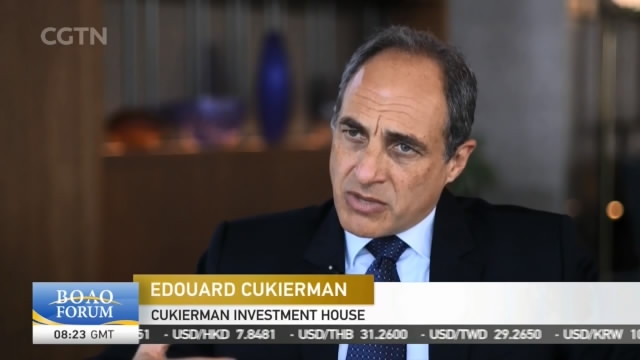
17:11, 07-Apr-2018
Boao Forum for Asia: Each Asian country developing at its own pace

YANG CHENGXI SHANGHAI 2018 marks the 40th anniversary of China's Reform and Opening up policy. For the past four decades, the policy has helped China's GDP grow nearly tenfold and lifted millions of people out of poverty. It's a policy that champions the market economy as well as competition for companies domestic and foreign. Chinese Premier Li Keqiang promised to take the policy to a new level during the just ended National People's Congress. China has also climbed up the global trade and investment value chain over the years. It has moved from a world factory of basic products to an economy propelled by high-technology. Cross-border trade and investment by tech firms also have been gaining momentum. For more on that, we go to Stephanie Freid in Tel Aviv, Israel.
STEPHANIE FREID TEL AVIV "Today I'm at the GoForIsrael business Conference in Tel Aviv where the focus is on investment, Israel-startups and collaboration between startups and foreign investors and partners, particularly in China. This is one of multiple conferences held throughout the year aiming to match potential investors with groundbreaking tech startups in areas of artificial intelligence, IT, cybersecurity, advanced manufacturing, medical tech and on and on. Some of China's top business leaders are here - and one of the forums focuses on Israel companies doing business in and with China. Last year, China invested a record sixteen point five billion dollars in Israel Edouard Cukierman leads the top investment house in the country and organized this conference. Here's what he has to say about China-Israel collaboration.
STEPHANIE FREID TEL AVIV "China is predicted to be the No. 1 investor in Israel business - overtaking the U.S. as Israel's biggest source of foreign funding. Now let's go to CGTN's Miro Lu in Singapore to get the latest there."
MIRO LU SINGAPORE "Singapore is settling into its one-year rotating chairmanship of the Association of Southeast Asian Nations at a time when the region's economic growth is outperforming the world. Some expect Singapore, as a regional hub and perhaps ASEAN's most open economy, to take a stronger leadership role. Prime Minister Lee Hsien Loong at the ASEAN chairmanship handover ceremony last November said Singapore would promote the theme of 'resilience and innovation' and encourage its fellow ASEAN members to deal with emerging security threats, including terrorism, cybercrime and climate change. He said his government would also push regional economic integration to enhance connectivity, focus on innovative ways to leverage digital technologies and scale up the skills and capabilities of ASEAN citizens. Singapore intends to focus on e-commerce and the digital economy. The priority is to streamline regional trade rules governing e-commerce, improve digital connectivity for businesses with a focus on smaller enterprises, and improve trade facilitation in the region. ASEAN's digital economy is projected to reach 200 billion US dollars by 2025. Besides facilitating trade within ASEAN, Singapore would also try to push forward talks for the ASEAN-led Regional Comprehensive Economic Partnership, and hopes to get a consensus by the end of this year among member countries. RCEP is a free trade agreement with all of ASEAN's ten states and its six FTA partners, including China, India, Australia, New Zealand, Japan and South Korea. The trade pact will represent almost half of the world's population, contributing to about 30 percent of the global GDP and over a quarter of world export."
YANG CHENGXI SHANGHAI "Going forward, China has pledged to lower overall tariffs even more while widening market access. The first-ever China International Import Expo will be held here in Shanghai this November. More than one thousand firms from over 120 countries say they will attend the expo. The government sees the gathering as one of its most important global events in 2018, a sign of China's commitment to remain one of the major growth engines for the world economy. YCX CGTN SHANGHAI."

SITEMAP
Copyright © 2018 CGTN. Beijing ICP prepared NO.16065310-3
Copyright © 2018 CGTN. Beijing ICP prepared NO.16065310-3